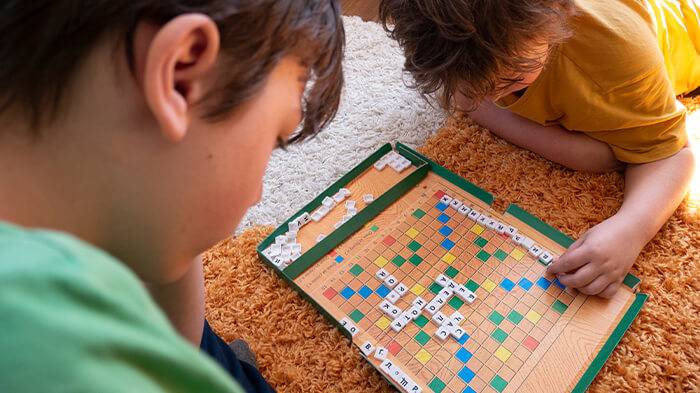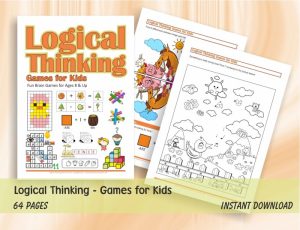
The early years of a child’s life are crucial for cognitive development, laying the foundation for future learning and success. Educational games offer a fun and engaging way to stimulate young minds, helping children develop essential cognitive skills that are vital for their academic and social growth. This article delves into the world of educational games, exploring their benefits, types, and how to choose the best ones for your child.
Educational games can be a powerful tool for fostering cognitive development. By engaging children in playful activities that challenge their minds, these games help them develop essential skills such as problem-solving, critical thinking, memory, attention, language, and spatial reasoning. This article aims to provide parents, educators, and caregivers with a comprehensive guide to understanding the role of educational games in cognitive development and how to effectively incorporate them into a child’s daily life.
Types of Educational Games for Cognitive Development

Educational games offer a fun and engaging way to enhance cognitive skills in children and adults. These games are designed to stimulate different areas of the brain, promoting learning and development.
Logic and Reasoning
Logic and reasoning games challenge players to think critically, solve problems, and make decisions based on information and rules. These games encourage analytical thinking, pattern recognition, and the ability to deduce solutions.
- Puzzles: Puzzles, such as jigsaw puzzles, crosswords, and Sudoku, require players to analyze shapes, patterns, and relationships to solve them. They improve spatial reasoning, problem-solving, and attention to detail. These games are suitable for a wide range of ages, with variations in complexity to cater to different skill levels.
- Strategy Games: Strategy games like chess, checkers, and Go demand players to think ahead, plan their moves, and anticipate their opponent’s strategies. They promote critical thinking, strategic planning, and decision-making skills. Strategy games are often enjoyed by older children and adults, but simpler versions can be adapted for younger learners.
- Coding Games: Coding games introduce players to programming concepts and logic through interactive puzzles and challenges. They encourage computational thinking, problem-solving, and creativity. Coding games are becoming increasingly popular for children and adults, offering a fun way to learn valuable skills for the digital age. These games are typically suitable for school-aged children and adults, although simplified versions are available for younger learners.
Memory and Attention
Memory and attention games help improve focus, concentration, and the ability to recall information. They engage players in tasks that require them to remember patterns, sequences, or details.
- Matching Games: Matching games involve finding pairs of identical items, such as pictures, numbers, or words. They enhance visual memory, attention to detail, and cognitive speed. Matching games are suitable for children of all ages, with variations in complexity and themes to cater to different interests.
- Memory Games: Memory games, like Concentration or Memory Match, require players to remember the location of cards or objects after they have been flipped over. They improve short-term memory, focus, and recall abilities. These games are popular for children and adults, with variations in difficulty and themes to suit different age groups.
- Word Games: Word games, such as Scrabble, Boggle, and crosswords, challenge players to remember words, their spellings, and their meanings. They enhance vocabulary, language skills, and memory. Word games are suitable for older children and adults, but simpler versions can be adapted for younger learners.
Language and Literacy
Language and literacy games foster vocabulary development, reading comprehension, and communication skills. They engage players in activities that encourage them to use language creatively and effectively.
- Storytelling Games: Storytelling games, like Mad Libs or storytelling prompts, encourage players to use language creatively and develop their narrative skills. They enhance vocabulary, imagination, and communication skills. These games are suitable for children and adults of all ages, with variations in complexity and themes to cater to different interests.
- Vocabulary Games: Vocabulary games, such as word association, crossword puzzles, and vocabulary quizzes, challenge players to learn and recall new words and their meanings. They enhance vocabulary, language comprehension, and communication skills. These games are suitable for children and adults, with variations in difficulty and themes to suit different age groups.
- Phonics Games: Phonics games help children learn the sounds of letters and how to blend them together to form words. They enhance phonological awareness, reading skills, and spelling abilities. These games are typically designed for preschool and early elementary school children.
Math and Science
Math and science games introduce players to concepts in mathematics, science, and logic through engaging activities. They encourage problem-solving, critical thinking, and a love for learning.
- Number Games: Number games, such as board games involving dice or cards, help children develop number sense, counting skills, and basic math operations. They encourage problem-solving, strategic thinking, and a love for numbers. These games are suitable for children of all ages, with variations in complexity and themes to cater to different interests.
- Science Exploration Games: Science exploration games, such as virtual simulations or hands-on experiments, introduce players to scientific concepts and encourage them to investigate the world around them. They promote curiosity, critical thinking, and problem-solving skills. These games are suitable for children and adults of all ages, with variations in complexity and themes to suit different interests.
- Logic Puzzles: Logic puzzles, such as KenKen or Sudoku, challenge players to use deductive reasoning and logic to solve problems involving numbers or symbols. They enhance critical thinking, problem-solving, and analytical skills. These games are suitable for older children and adults, but simpler versions can be adapted for younger learners.
Social-Emotional Skills
Social-emotional skills games help children develop empathy, cooperation, and social awareness. They engage players in activities that promote teamwork, communication, and emotional intelligence.
- Cooperative Games: Cooperative games, such as Pandemic or Forbidden Island, require players to work together to achieve a common goal. They encourage teamwork, communication, and problem-solving skills. These games are suitable for children and adults of all ages, with variations in complexity and themes to suit different interests.
- Role-Playing Games: Role-playing games, such as Dungeons & Dragons or improv games, encourage players to step into different roles and perspectives. They enhance empathy, communication, and creativity. These games are typically enjoyed by older children and adults, but simpler versions can be adapted for younger learners.
- Empathy-Building Games: Empathy-building games, such as “What Would You Do?” scenarios or emotional awareness activities, encourage players to understand and respond to the feelings of others. They promote emotional intelligence, social awareness, and empathy. These games are suitable for children and adults of all ages, with variations in complexity and themes to suit different interests.
Choosing the Right Educational Games
Choosing the right educational games for children is crucial to ensure their cognitive development is nurtured and enhanced. A well-chosen game can stimulate a child’s imagination, creativity, and critical thinking skills, making learning enjoyable and engaging.
Factors to Consider When Selecting Educational Games
It’s essential to consider several factors when selecting educational games for children. These factors ensure the chosen games are appropriate for the child’s age, learning style, and developmental stage.
- Age and Developmental Stage: The game should be appropriate for the child’s age and developmental stage. For example, a game designed for preschoolers might be too simplistic for a first-grader, while a game for teenagers might be too complex for a younger child.
- Learning Styles and Interests: Children learn in different ways. Some children are visual learners, while others are auditory or kinesthetic learners. Consider the child’s learning style and choose games that cater to their preferred learning method. Also, select games that align with the child’s interests. A child who enjoys dinosaurs will likely be more engaged in a game about dinosaurs than one about space exploration.
- Educational Goals and Objectives: What do you want your child to learn from the game? Do you want to improve their math skills, reading comprehension, or problem-solving abilities? Choose games that align with your educational goals.
- Availability of Resources: Some educational games require online access, while others can be played offline. Consider the availability of resources when choosing a game. If you don’t have reliable internet access, choose a game that can be played offline.
- Parental Involvement and Engagement: Parental involvement is crucial for maximizing the benefits of educational games. Play games with your child, discuss the concepts they’re learning, and help them apply their new skills to real-life situations.
Educational Game Platforms and Their Features
Several educational game platforms offer a wide range of games for children of all ages. The table below compares some popular platforms and their key features:
| Platform | Age Range | Key Features | Cost |
|---|---|---|---|
| ABCmouse.com | 2-8 years | Interactive lessons, games, and activities covering a wide range of subjects, including reading, math, science, and art. | Subscription-based, with monthly or annual fees. |
| Khan Academy Kids | 2-7 years | Engaging games and activities designed to teach early literacy, math, and social-emotional skills. | Free |
| Osmo | 3-10 years | Physical and digital games that use a camera and a reflective base to bring objects from the real world into the digital world. | Physical kit and subscription-based. |
| Minecraft | 6+ years | Open-world sandbox game that allows players to build, explore, and create. Offers opportunities for creative problem-solving and collaboration. | One-time purchase. |
Integrating Educational Games into Daily Life

Educational games can be seamlessly woven into a child’s daily routine, making learning enjoyable and enriching. Integrating these games into everyday activities can foster a love for learning and contribute to cognitive development.
Sample Weekly Schedule Incorporating Educational Games
A well-structured weekly schedule can help integrate educational games into a child’s routine effectively. Here is a sample schedule:
| Day | Morning Activity | Afternoon Activity | Evening Activity | Game Type | Skill Focus | Benefits |
|---|---|---|---|---|---|---|
| Monday | Reading aloud | Outdoor play | Storytelling | Interactive storytelling | Language development, imagination | Enhances vocabulary, improves listening skills, stimulates creativity. |
| Tuesday | Breakfast preparation | Art and craft | Board games | Logic puzzles | Problem-solving, critical thinking | Develops reasoning skills, enhances strategic thinking, promotes logical deduction. |
| Wednesday | Music and movement | Building blocks | Interactive games | Memory games | Memory, focus, attention | Improves concentration, strengthens recall, enhances cognitive flexibility. |
| Thursday | Nature walk | Science experiment | Card games | Matching games | Pattern recognition, visual perception | Develops observation skills, enhances visual processing, promotes spatial awareness. |
| Friday | Chores and responsibilities | Free play | Family game night | Cooperative games | Teamwork, collaboration | Encourages social interaction, fosters communication skills, promotes empathy and understanding. |
| Saturday | Cooking class | Creative writing | Puzzles and riddles | Word games | Vocabulary, language skills | Expands vocabulary, improves language comprehension, enhances verbal fluency. |
| Sunday | Relaxation and downtime | Board games | Story time | Role-playing games | Social skills, empathy | Develops social awareness, promotes understanding of different perspectives, enhances emotional intelligence. |
Strategies for Making Educational Games Fun and Engaging
Making educational games fun and engaging is crucial for maximizing their effectiveness.
- Encourage active participation and exploration: Let children explore the games at their own pace, encouraging them to experiment and discover new strategies. This fosters a sense of ownership and promotes intrinsic motivation.
- Create a positive and supportive learning environment: Provide a safe and encouraging space where children feel comfortable taking risks and making mistakes. Positive reinforcement and praise can boost confidence and encourage continued participation.
- Celebrate achievements and progress: Acknowledge and celebrate even small milestones, highlighting the child’s effort and progress. This reinforces their learning and motivates them to strive for further improvement.
- Offer opportunities for collaboration and teamwork: Encourage children to play together, fostering social interaction and teamwork. Cooperative games promote communication, empathy, and problem-solving skills.
In conclusion, educational games offer a valuable opportunity to enhance cognitive development in children. By incorporating these games into daily routines, parents and educators can create a playful learning environment that fosters essential skills and promotes a love for learning. As technology continues to advance, the world of educational games is constantly evolving, offering new and exciting ways to engage children and unlock their full potential.
By exploring the diverse range of games available and choosing those that align with a child’s age, interests, and learning style, parents and educators can make a significant impact on their cognitive development and set them on a path towards a bright future.
FAQ Guide
What are some examples of educational games that can help with language development?
Storytelling games, vocabulary games, and phonics games are excellent for promoting language development. These games encourage children to use their vocabulary, develop their understanding of grammar, and improve their reading and writing skills.
How can I make educational games more engaging for my child?
Make it a collaborative experience! Play along with your child, encourage them to explore and experiment, and celebrate their achievements. Create a positive and supportive learning environment where they feel comfortable taking risks and trying new things. You can also use games as a way to connect with your child, building a strong bond through shared experiences.
Are there any educational games specifically designed for children with special needs?
Yes, there are many educational games designed for children with special needs. These games often cater to specific learning styles and challenges, providing a tailored approach to learning. It’s important to consult with your child’s therapist or educator to find the best resources for their individual needs.




